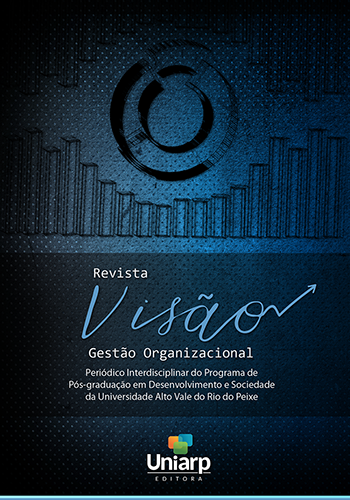SMART CONTRACTS AS A DECISIVE TECHNOLOGY IN LEGAL MANAGEMENT IN PANDEMIC PERIOD
SMART CONTRACTS AS A DECISIVE TECHNOLOGY IN LEGAL MANAGEMENT IN PANDEMIC PERIOD
DOI:
https://doi.org/10.33362/visao.v10i1.2452Keywords:
Contratos, Smart Contracts, PandemiaAbstract
Contracts are bilateral legal deals that regulate will agreements. Several principles need to be analyzed when it comes to this theme, among them, especially that of autonomy of will, mandatory strength, good faith and consensualism. In times of pandemic, it can be difficult to consult a lawyer in person to draft a contract, it is in this context that Smart Contracts are presented. This study, therefore, has the scope of analyzing Smart Contracts as an alternative method for the atypical situation in which the world currently finds itself. It will also seek to highlight the positive and negative aspects of hiring in a virtual environment, as well as the regulatory technology and the digital contract. For the purposes sought, regarding the methodological aspects, the research was of a basic nature, with a qualitative approach, exploratory and bibliographic objective of the narrative type. Smart contracts are promising in the current scenario, due to their development being carried out with extremely secure technology, constituting great facilitators in the elaboration of agreements. They tend to become more and more popular in the near future.
References
CARVALHO, Carla Arigony de; ÁVILA, Lucas Veiga. A tecnologia blockchain aplicada aos contratos inteligentes. Revista Univem, 2019. Disponível em: https://revista.univem.edu.br/emtempo/article/view/3210 Acesso em: 08 nov. 2020.
EFFING, Antonio Carlos; SANTOS, Adrielly Pinho dos. Análise dos smart contracts à luz do princípio da função social dos contratos no direito brasileiro. Revista Direito e Desenvolvimento, 2018. Disponível em: https://periodicos.unipe.br/index.php/direitoedesenvolvimento/article/view/755/554 Acesso em: 10 nov. 2020.
FERRAZ, Robertson Novelino. As tecnologias envolvendo os contratos inteligentes (smart contracts) e alguns dos impactos nos contratos. Universidade Federal de Pernambuco – UFPE. Recife, 2019. Disponível em: https://repositorio.ufpe.br/handle/123456789/37502 Acesso em: 14 set. 2020.
GAGLIANO, Pablo Stolze; PAMPLONA FILHO, Rodolfo. Manual de Direito Civil, volume único. 2 ed. São Paulo: Saraiva.
GAGLIANO, Pablo Stolze; PAMPLONA FILHO, Rodolfo. Novo curso de direito civil, volume 4: contratos. 2 ed. São Paulo: Saraiva Educação, 2019.
MOUGAYAR, William. BlockChain para negócios - Promessa, Prática e Aplicação da Nova Tecnologia da Internet. 1 ed. Rio de Janeiro: Alta Books, 2017.
PARGENDLER, Mariana. O direito contratual comparado em nova perspectiva: revisitando as diferenças entre os sistemas romano-germânico e de common law. Scielo, 2017. Disponível em: https://www.scielo.br/scielo.php?script=sci_arttext&pid=S1808-24322017000300796&lang=pt. Acesso em: 07 out. 2020.
TARTUCE, Flávio. Direito Civil: teoria geral dos contratos e contratos em espécie. 15 ed. Rio de Janeiro: Forense, 2020.
Downloads
Published
How to Cite
Issue
Section
License
Copyright (c) 2021 Rodrigo Regert, Sabrina, André, Pedro, Jaquelyne, Thiara

This work is licensed under a Creative Commons Attribution-NonCommercial 4.0 International License.
Estou ciente de que, através da submissão voluntária de meu texto ao corpo editorial da revista Visão, editada pela Universidade Alto Vale do Rio do Peixe - UNIARP, estou concedendo à Universidade Alto Vale do Rio do Peixe a autorização de publicar o respectivo texto na revista a título não oneroso e declarando a originalidade do texto e sua não submissão simultanea a qualquer outro periódico, em meu nome e em nome dos demais coautores, se eventualmente existirem.Reitero que permaneço como legítimo titular de todos os direitos patrimoniais que me são inerentes na condição de autor. Comprometo-me também a não submeter este mesmo texto a qualquer outro periódico no prazo de, pelo menos, um (1) ano. Declaro estar ciente de que a não observância deste compromisso acarretará em infração e conseqüente punição tal como prevista na Lei de Proteção de Direitos Autorias (Nº9609, de 19/02/98).












 Revista Visão: Gestão Organizacional está licenciado com uma Licença
Revista Visão: Gestão Organizacional está licenciado com uma Licença 